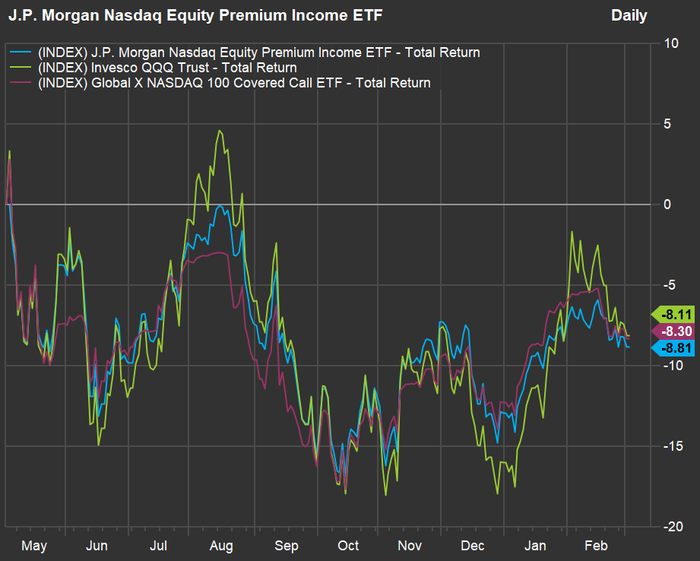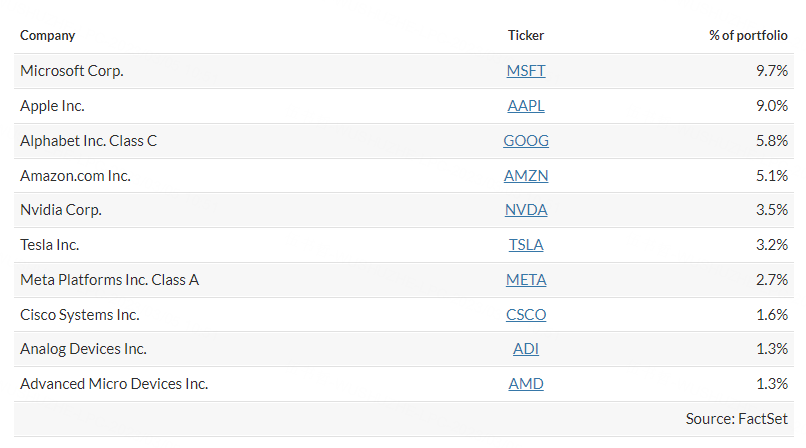The JPMorgan Nasdaq Equity Premium Income ETF uses artificial intelligence to help with stock selection. It uses a covered call strategy to pay high dividends.
Rising interest rates have made bonds more attractive over the past year, but they have also led to higher volatility for stocks. And that means higher dividend income for equity funds that write covered call options. Income-seeking investors should at least become familiar with these strategies.
The JPMorgan Nasdaq Equity Income ETF $(JEPQ)$ has grown to $1.6 billion in assets under management in only 10 months. Hamilton Reiner, one of the fund's co-managers, explained its strategy and contrasted it with the $JPMorgan Equity Premium Income ETF.
The main difference between JEPQ and JEPI is how the exchange-traded funds select stocks. JEPI is benchmarked to the S&P 500 and holds between 100 and 150 stocks selected by its managers with the assistance of JPMorgan's equity analysts.
JEPQ is benchmarked to the Nasdaq-100 Index, which is made up of the largest 100 nonfinancial companies within the full Nasdaq Composite Index. But it is not limited to the Nasdaq-100.
Reiner, who is head of U.S. Equity Derivatives at JPMorgan Asset Management, explained that he and co-managers Andrew Stern and Eric Moreau select stocks for JEPQ with the assistance of artificial intelligence technology that analyzes thousands of corporate filings and financial reports to project "earnings estimates three to five years out."
Selected companies aren't limited to those in the Nasdaq-100. For example, PepsiCo Inc. $(PEP)$ is a component of the Nasdaq-100, but JEPQ holds shares of Coca-Cola Co. $(KO)$, which isn't a component of the index, because "it is more attractive per our process," Reiner said.
What type of investor is JEPQ designed for?
JEPQ's stated goals are to generate monthly income by selling covered call options and holding a portfolio of large-cap stocks. It's benchmarking to the Nasdaq-100 makes for heavy weighting to technology companies. Long-term growth is a secondary objective of the fund. A third goal is to maximize "risk-adjusted expected returns" through the AI component of its stock selection process.
In other words, JEPQ can be an appropriate investment for you if you want monthly income and if you want an investment that will be less volatile over time than the Nasdaq-100 index, which itself is tracked by the Invesco QQQ Trust $(QQQ)$.
Reiner said JEPQ shareholders can expect the fund's monthly distributions to equate to annual yields ranging between 9% and 11%. He also expects JEPQ to capture less of QQQ's downside during market declines, along with "some of the equity upside," for similar overall performance if dividends are reinvested.
All of this means that equity funds with covered call strategies are best for investors who want the income and/or wish to smooth out performance, especially during downcycles in the stock market. Since the monthly distributions are taxed (unless the investment is in a tax-deferred retirement account), an investor who wants to pursue a pure long-term growth strategy might be better served with a fund that doesn't emphasize dividends.
Covered call strategies
The use of options to enhance income for stock funds is nothing new, but the strategy gained popularity during the long period of low interest rates and became even more popular during the bear market of 2022.
A call option is a contract that allows an investor to buy a security at a particular price (called the strike price) until the option expires. A put option is the opposite, allowing the purchaser to sell a security at a specified price until the option expires.
A covered call option is one an investor can write when they already own a security. The strike price is typically "out of the money," which means it is higher than the stock's current price.
For example, you might hold 100 shares of a stock that is currently trading for $100 a share. You like the stock, but would be willing to part with it for a certain price, say $110. You sell a call option for a fee to an investor who believes the shares will trade much higher than $110 before the option expires. If the stock then moves above $110, you are forced to sell it for that price. You keep your option fee, but now need to find something else to invest in. But if the stock doesn't rise above $110 before the option expires, you still keep your option premium and are free to write another call option.
This type of activity during a period of high volatility can enhance income greatly. It also makes a portfolio less volatile than the broad market. The price you pay is that you give up some of the upside. In the above example, if the stock had doubled to $200, you would still be forced to sell it for $110.
Investors looking to make use of such an active strategy might best be served doing so through mutual funds or exchange-traded funds.
JEPQ makes used of equity-linked notes to pursue its covered-call strategy with up to 20% of the fund's portfolio. See the JEPI article for an actual covered-call trade example and more about equity-linked notes.
JEPQ' stock selection process and use of equity-linked notes to pursue its covered all strategy also stand in contrast to the Global X NASDAQ 100 Covered Call ETF $(QYLD.UK)$, which also pays monthly dividends while holding all the stocks in QQQ and writing covered call options on the entire Nasdaq-100.
Performance
JEPQ is less than a year old, a short period for a fund, although growing to $1.6 billion since the fund was launched on May 3 underlines how quickly investors have warmed to the strategy. For a benchmark comparison, here's how the fund has performed on a total return basis, with dividends reinvested, against QQQ and QYLD since inception:
You can see that JEPQ has been considerably less volatile than QQQ. And during this year's rebound, it has captured less of the upside than QQQ or QYLD.
Volatility is still high, which means JEPQ is quoting an SEC 30-day dividend yield for its monthly distributions of 15.67%. (Total return and yield quotes are net of the fund's annual expenses, which are 0.35% of assets under management.) But keep in mind that over the long haul Reiner expects the distribution yield to range from 9% to 11%.
If we sum up the nine monthly distributions JEPQ has made since it was established in May, the total has been $4.29 a share, or 10.27% of its net asset value of $41.81 at the close on March 1. That is not an annualized yield.
Top stock holdings
JEPQ posts its full list of holdings every day. The ETF holds 77 stocks, which make up 81% of its portfolio. Technology stocks make up about 40% of the portfolio.
Here are the fund's top 10 stock holdings:


